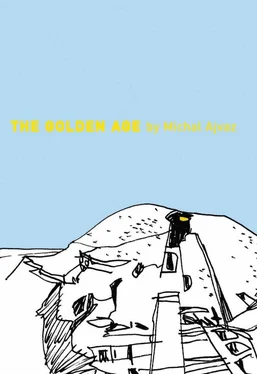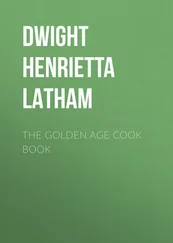Michal Ajvaz - The Golden Age
Здесь есть возможность читать онлайн «Michal Ajvaz - The Golden Age» весь текст электронной книги совершенно бесплатно (целиком полную версию без сокращений). В некоторых случаях можно слушать аудио, скачать через торрент в формате fb2 и присутствует краткое содержание. Год выпуска: 2010, Издательство: Dalkey Archive Press, Жанр: Современная проза, на английском языке. Описание произведения, (предисловие) а так же отзывы посетителей доступны на портале библиотеки ЛибКат.
- Название:The Golden Age
- Автор:
- Издательство:Dalkey Archive Press
- Жанр:
- Год:2010
- ISBN:нет данных
- Рейтинг книги:4 / 5. Голосов: 1
-
Избранное:Добавить в избранное
- Отзывы:
-
Ваша оценка:
- 80
- 1
- 2
- 3
- 4
- 5
The Golden Age: краткое содержание, описание и аннотация
Предлагаем к чтению аннотацию, описание, краткое содержание или предисловие (зависит от того, что написал сам автор книги «The Golden Age»). Если вы не нашли необходимую информацию о книге — напишите в комментариях, мы постараемся отыскать её.
is Michal Ajvaz’s greatest and most ambitious work.
The Golden Age
The Golden Age — читать онлайн бесплатно полную книгу (весь текст) целиком
Ниже представлен текст книги, разбитый по страницам. Система сохранения места последней прочитанной страницы, позволяет с удобством читать онлайн бесплатно книгу «The Golden Age», без необходимости каждый раз заново искать на чём Вы остановились. Поставьте закладку, и сможете в любой момент перейти на страницу, на которой закончили чтение.
Интервал:
Закладка:
What sort of performance have I ended up watching? I asked myself in irritation. I had no interest in the problems the characters of the play would be addressing; the unhappiness of a man who is given rabbit skins in place of a newspaper had nothing to say to me. But I couldn’t just leave because I was on a boat. God knows how long it will be before the boat pulls up at the next stop! What am I going to have to sit through? How many more wooden figures will be coming on stage? The only mild comfort I took from this involuntary artistic adventure came from the fact the actors were puppets, which meant that I did not have to look into the faces of the actors, which were bound to be dull and disagreeable. Looking at live actors would certainly have upset me. In resignation I sank into the plush of the seat.
Waiting for the prince
The head of the second puppet, which until now had been looking fixedly ahead, turned abruptly to the man-puppet; the body stayed where it was. “Fool,” said the woman angrily. “Why don’t you bring the rabbit skins home? We could collect them and after a while I’d have enough to make a fur coat with. And it’s so damned cold, we’ve been having blizzards for months.”
“I can’t bring the skins home because I keep losing them. They won’t let me into the coffee-houses with them, I have to give them up at the cloakroom. And when I leave they always give me something else in their place. I’ve had some strange tools, thick books on economics in German from the nineteenth century, plaster-cast busts of Roman statesmen, stuffed birds. They always claim they’re mine, and they always find about ten witnesses who saw me leave in the cloakroom a treatise on the railways in Styria or a stuffed owl. What I am supposed to do? I pick up the owl and make my way home through the blizzard. Sometimes I can’t help but weep, and so I walk along sobbing, my tears turning to ice.”
“I keep telling you not to go to coffee-houses. All you do there is spend money, and I’ve got nothing to wear. Coffee-houses are terrible places for spreading illness. They’re always saying on the radio that someone has gone mad in a coffee-house and started singing that long-drawn-out song about the end of conventional mathematics in some new, evil empire. The waiters are heretics and most of them are former or future killers of women. You can cry over a stuffed owl, but you don’t give any thought to me as you spend day after day in your coffee-houses, sitting on your ass with your friends while I’m sitting here all alone staring at the wall.”
“I go to coffee-houses because I have to. There’s nothing much there that makes me want to go in. In fact, I hate coffee-houses, and you’re quite right, they are incubators for the worst epidemics. The waiters beat the customers and strip them naked; this is particularly upsetting for the women, some of whom are even considering avoiding coffee-houses altogether. I’d far sooner be at home with you, especially with the weather as it is now, when it’s dark all the time and it never stops snowing, and the meteors whizz by on the blizzard. But what can I do about it? I simply have to go to the coffee-houses, I have to sit it out there in case the prince’s messenger arrives. I have to be ever prepared to receive his dispatches and instructions.”
“And how many of these dispatches have ever reached you, you fool?”
“None so far. Because enemies have got to the messenger and doped him, very discreetly. They rewrite the messages letter by letter, transforming them into something else altogether, like the service manual for a microwave oven or an advertisement for a second-hand-car dealer’s. But still I am able to identify in them distant traces of the voice of my master, and I can hear it calling for help. I know that the expedition to the City of Pure Light came to grief, that for a long time the prince wandered the swamplands, that he was taken captive by evil women who did him harm. Why, they even turned him into a woman and made him dance ballet in a little white skirt, in some sordid Not-Petersburg, a city born on the plains out of the murk of despair, a city which is cursed, a city within whose walls no saviour will ever be spawned. How my prince must be suffering! If I could I’d drop everything and set out in search of him. I’m sure he’s waiting for me, asking what’s taking me so long. But all his dispatches reach me in such violated form that I have no way of telling where they were issued. All the signs are so ambiguous; at one moment I’m sure that he’s in the Gobi Desert and I begin to plan my journey and learn Mongolian, then it appears he is being held captive in a certain apartment in Prague 8. I asked a prophet for advice, and he thought long and hard before telling me, ‘Gobi Desert or Prague 8, it is all the same.’ I feel that this holy man speaks the truth, but unfortunately my education is so poor that I am unable to grasp the profound import of his words.”
“I don’t believe there is any such person as this prince of yours. I think you made him up to explain your hanging around in coffee-houses all day, or else you dreamed him. At best he’s some kind of demon made of small strips of paper.”
The male puppet jumped up before stomping about the stage, waving his arms like Mr Punch. “How can you say such a thing! That there’s no such person as the prince! The prince is more real than any of us. Without him our lives would lose all sense and order; our letters would disintegrate so that once again they would be no more than fragments of the little letters from which they are glued together, and these would slowly gather in the Gospel of the Metal Tiger , whose renewal we have dreaded for five thousand years. We would be speechless because we would be unable to connect any subject with any predicate, and white larvae and ice monsters would get into the space between them. Without the prince all that would be left of us would be shavings composed — as is well known — of our bodies, and these shavings are gathered and held together due only to his goodness, due only to the fact that he speaks up for us to the gods, his parents. Even now, at a time for him so fraught with difficulties, he continues to think of us; he never forgets us, not even when he is performing solo at the ballet in Not-Petersburg. The clearest proof of this is the fact that still we haven’t disintegrated. Although I believe that recently there was a brief time when we slipped his mind, as I saw bodies beginning to come apart like the spines of well-thumbed books, this was surely nothing more than a moment of weakness for which we can hardly blame him because in his place we would have given up long ago and thought only of our ballet career, with its intoxicating footlights and its merry backstage soirées with caviar and champagne. O my noble prince! It is thanks to him that there is Order in the world; he might have ordained that the stains on old walls should writhe, that the animals should berate us all day long, as used to be the case in the dark days of old, before the prince was born to his divine mother. But surely you remember this? Is that what you want, that our sufferings of those years should return? Do you not recall how unpleasant it was to be woken in the morning by the pigeons walking along the windowsills, speaking of us in disgusting obscenities which, resisting our efforts to shoo them away, they would repeat at lunch in front of our children? And our children lost all respect for us; they conspired against us with the animals and bullied us. And although the animals gave us an apology before they flew away from the planet, our children refused to do the same, writing to us that they had procured a pen with green ink like pus which stank most dreadfully, and it was with this pen that they would write the words ‘father’ and ‘mother’ for ever more.”
Читать дальшеИнтервал:
Закладка:
Похожие книги на «The Golden Age»
Представляем Вашему вниманию похожие книги на «The Golden Age» списком для выбора. Мы отобрали схожую по названию и смыслу литературу в надежде предоставить читателям больше вариантов отыскать новые, интересные, ещё непрочитанные произведения.
Обсуждение, отзывы о книге «The Golden Age» и просто собственные мнения читателей. Оставьте ваши комментарии, напишите, что Вы думаете о произведении, его смысле или главных героях. Укажите что конкретно понравилось, а что нет, и почему Вы так считаете.












